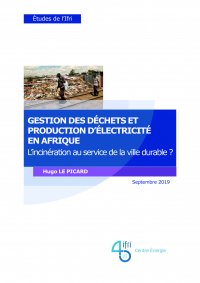Gateway to Think Tanks
| 来源类型 | Publications - Reports |
| 规范类型 | 报告 |
| DOI | 979-10-373-0066-9 |
| Waste Management and Electricity Generation in Africa: Developing Waste-to-Energy to the Benefit of Sustainable Cities? Études de l'Ifri, September 2019 | |
| Hugo LE PICARD | |
| 发表日期 | 2019-09-18 |
| 出版年 | 2019 |
| 概述 | With the expansion of modern production and consumption patterns to large African cities, population growth and urbanization, production of municipal waste has risen sharply. Unregulated dumps are becoming numerous and have strong negative health effects by polluting the local environment.... |
| 摘要 |
Waste Management and Electricity Generation in Africa: Developing Waste-to-Energy to the Benefit of Sustainable Cities? Études de l'Ifri, September 2019
With the expansion of modern production and consumption patterns to large African cities, population growth and urbanization, production of municipal waste has risen sharply. Unregulated dumps are becoming numerous and have strong negative health effects by polluting the local environment.  Mismanagement of waste fosters the proliferation of mosquitoes in the cities. In recent years, the frequency of arbovirosis epidemics has increased. In addition, the degradation of waste in open dumps emits methane, a gas with a very high global warming potential. Despite being endowed with abundant energy resources, sub-Saharan populations have the lowest electricity access rates in the world. Yet, electricity access has an important influence on the well-being of a population: it improves access to education, communication and quality health care. In the long term, poor access to energy and electricity services hampers development prospects and the weakness of sub-Saharan power grids represents a significant cost for national economies. Waste-to-energy plants appear as an effective means of treating these two problems as one. In August 2018, the first waste-to-energy plant on the African continent was inaugurated in Addis Ababa. Today, other sub-Saharan countries, like Kenya, seem to be interested in developing waste-to-energy solutions. Could this be the beginning of a large deployment of this technology in sub-Saharan Africa? This note describes the challenges posed by the increase of waste production and the low progress in electrifying the continent. It provides an assessment of the advantages and limits of waste-to-energy projects as a solution. Finally, it derives lessons from a case study on the first waste-to-energy plant in Africa: the Reppie power plant in Addis Ababa. This content is available in French: Gestion des déchets et production d’électricité en Afrique : l’incinération au service de la ville durable ?
|
| 关键词 | Electricity access Energy Sustainable city Waste Sub-Saharan Africa |
| URL | https://www.ifri.org/en/publications/etudes-de-lifri/waste-management-and-electricity-generation-africa-developing-waste |
| 来源智库 | French Institute of International Relations (France) |
| 引用统计 | |
| 资源类型 | 智库出版物 |
| 条目标识符 | http://119.78.100.153/handle/2XGU8XDN/416548 |
| 推荐引用方式 GB/T 7714 | Hugo LE PICARD. Waste Management and Electricity Generation in Africa: Developing Waste-to-Energy to the Benefit of Sustainable Cities? Études de l'Ifri, September 2019. 2019. |
| 条目包含的文件 | ||||||
| 文件名称/大小 | 资源类型 | 版本类型 | 开放类型 | 使用许可 | ||
| etude_dechets_picard(29KB) | 智库出版物 | 限制开放 | CC BY-NC-SA |  浏览 | ||
| lepicard_dechets_201(1595KB) | 智库出版物 | 限制开放 | CC BY-NC-SA | 浏览 | ||
除非特别说明,本系统中所有内容都受版权保护,并保留所有权利。